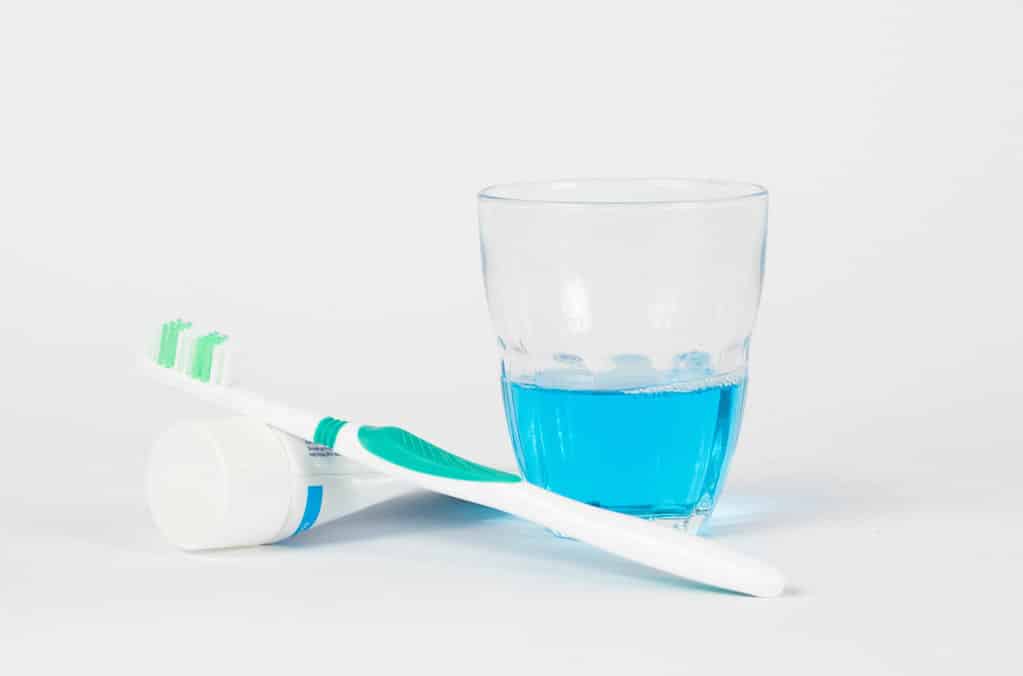Reaching for the bottle of mouthwash on your bathroom counter to clean your furry friend’s stinking mouth is easy.
After all, mouthwash contains antiseptic properties that kill harmful bacteria causing bad breath, you reason.
However, you may wonder if this oral rinse is safe for your furry friend before using it on them, as it’s only for human use.
So, can dogs have mouthwash?
No, dogs can’t have mouthwash because it contains harmful ingredients like alcohol and xylitol.
For instance, alcohol causes low blood sugar and incoordination in these canines.
That said, you can opt for safer alternatives like homemade dog mouthwashes to clean your pup’s mouth.
This article discusses the ingredients that make mouthwash toxic to dogs.
In addition, there are examples of dental and other health problems that cause bad breath in these canines.

What makes mouthwash toxic to dogs
Below are mouthwash ingredients that may harm your pooch.
Xylitol
Xylitol is used in flavoring mouthwash to suit different consumer tastes.
Although this compound is safe for humans, its consumption, even in small amounts, causes dogs to suffer from dire health consequences like:
- Low blood sugar
- Liver failure
- Seizures
- Death
Alcohol
Fido’s liver is not designed to break down or metabolize alcohol.
Alcohol poisoning in dogs can be critical; contact the vet if your pup shows the following symptoms after consuming more than a few sips of mouthwash.
- Respiratory difficulties
- Low body temperatures
- Low blood sugar
- Slow movement
- Drooling
- Incoordination
Flouride
Instead of enhancing dogs’ dental health, fluoride consumption affects brain development, disrupts hormones, and reduces bone strength in these canines.
Therefore, avoiding giving your pup fluoride-rich fluids like mouthwash is best.

What to do when dogs drink mouthwash
Dogs’ wouldn’t voluntarily drink mouthwash as it has a tingling burning effect.
However, if they lick or drink it accidentally, watch them for the next twelve hours and contact the vet if they show signs like refusing to eat and diarrhea.
Avoid giving your pooch over-the-counter medications without contacting the vet, as it could cause more harm to Fido.
Usually, dogs often only require induced vomiting to recover from mouthwash’s immediate side effects.
How to fight dogs’ bad breath
Mouthwash won’t fight your pup’s bad breath.
That said, below are some healthy alternatives that prevent plaque and tartar build-up, which causes bad breath in dogs.
Brushing
Brushing Fido’s teeth with a dog-friendly toothbrush and toothpaste daily or after every few days is the best way of cleaning their mouth.
It involves mechanically removing the plaque on dogs’ teeth, reducing the chances of smelly mouths.
Furthermore, dog toothpaste is gentle to your pup’s digestive system and has a nice flavor that they enjoy.
Providing proper diet
Gum problems are the leading cause of bad breath in dogs, and your pup is more prone to developing them if their diet lacks vitamins B9, B5, B3, B2, and A.
In this regard, ensure that Fido always has a balanced diet containing all essential nutrients to promote dental health.
Dental treats and chews
Dental treats are coarse hence easily remove most of the bacteria, causing your puppy’s mouth to smell.
These treats are also infused with dog-friendly ingredients that will refresh Fido’s breath.
If your pooch gets bored quickly, switch the flavors each time you offer them dental treats and chews.
You should also ensure that the stiffness of these treats is compatible or safe for your dog’s size to avoid causing dental harm and choking.
Homemade mouthwashes for dogs
Routine home dental care is vital in fighting Fido’s bad breath.
Below are some dog mouthwashes you can prepare at home.
- Coconut oil mouthwash – Mix a teaspoon of melted coconut oil with a teaspoon of baking soda, then add the mixture to some water and use it to clean Fido’s teeth.
- Echinacea mouthwash – Add one teaspoon of echinacea to a cup of water and let it boil for ten minutes to make a dog-safe mouthwash. You must allow this oral rinse to cool for one hour and then strain it before cleaning Fido’s mouth.
- Peppermint mouthwash – Mix grounded peppermint leaves with a tablespoon of water or vegetable oil to make this oral rinse. You could spray or rub this mixture on your pup’s teeth to fight their bad breath.
Dental problems that cause bad breath in dogs
The leading cause of bad breath in dogs is dental problems.
They include:
- Plaque build-up – The accumulation of food residues forms plaque on dogs’ teeth. This can easily be removed by brushing your pooch daily. However, if not removed, it can harden and form tartar which requires scaling.
- Periodontal disease – Dogs suffer from periodontal disease when the plaque trapped between their teeth starts a series of infections that eventually damage the gums. This condition can become chronic and trigger your pup’s immune system if not treated in time.
Other health conditions that cause bad breath in dogs
Apart from plaque build-up and periodontal disease, below are some underlying health problems that could be causing Fido’s mouth to stink.
- Kidney disease – Breath that smells like feces is among the first signs of kidney problems in dogs which can be critical. Therefore, get your pup to the clinic for correct diagnosis when you can’t stand their kisses.
- Liver disease – Fido could be suffering from liver disease if they show other signs like diarrhea and vomiting along with the bad breath.
Frequently asked questions(FAQs)
Can my dog have dental water additives?
Dental water additives are safe for your pooch and are the best in fighting decays and bad breath.
There is a wide range of water additives; trying out different varieties is advisable to find the best one for your pup.
What is the difference between tartar and plaque?
Plaque is caused by food remains, sticks to your pup’s teeth like a layer, and is easy to remove.
On the other hand, tartar is hardened plaque and can be challenging to brush off.
Is Listerine safe for my dog?
Dogs should not have Listerine.
This mouthwash contains ethanol and menthol, which may harm your furry friend.
Is a regular toothbrush safe for my dog?
You aren’t allowed to clean Fido’s teeth using a regular toothbrush as it’s rough and large for them.
Use dog-friendly toothbrushes like those you can wear on your finger to clean your furry friend’s mouth.
Can I clean my dog’s mouth with salt water?
Saltwater is safe for dogs.
However, clean your pup’s mouth with diluted salt water to prevent them from dehydrating.
Conclusion
Mouthwash doesn’t fight your pup’s breath but only places them at risk of contracting severe health conditions like liver failure and respiratory difficulties.
Therefore, use homemade remedies like coconut oil mouthwash to freshen your pup’s mouth.
- What Dog Breeds Have Pink Skin? - March 24, 2023
- What Are the Most Inspiring Dog Breeding Quotes? - March 20, 2023
- Can Pheromone Spray Help Improve Dog Breeding Results? - March 19, 2023








